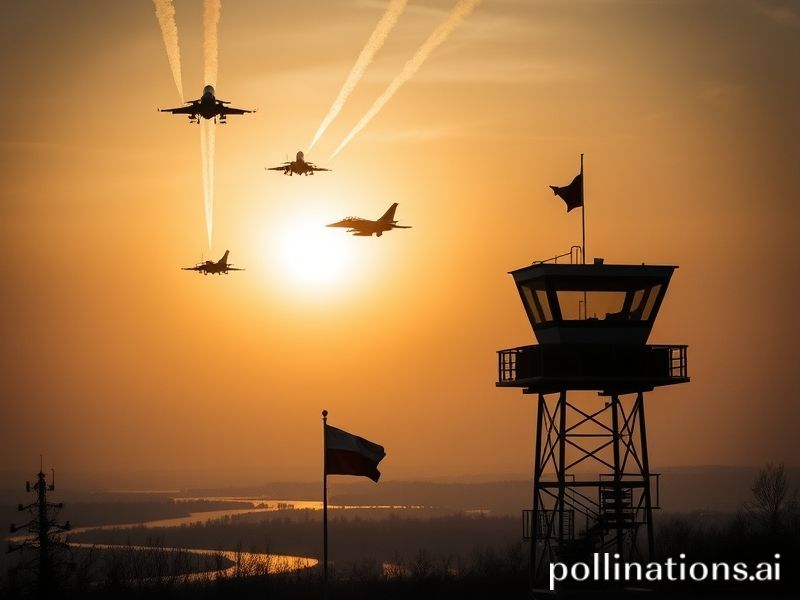Russian Jets Drop by Poland—A 3-Minute NATO Stress Test with Global Side Effects
Russian Jets Drop in on Poland—Uninvited, Unapologetic, and Just in Time for Tea
By Dave’s Locker International Desk
WARSAW—It started like any other Tuesday: commuters scrolling memes, baristas foaming oat milk, and the usual NATO radar operators sipping industrial-strength coffee while pretending to monitor every cubic inch of sky from the Baltic to Bratislava. Then, at 07:43 local time, Poland’s defense ministry reported a pair of Russian Su-35 fighters taking a scenic detour—roughly 40 kilometers inside Polish airspace, just long enough to ruin everyone’s breakfast. The incursion lasted three minutes, or, as the Kremlin prefers to call it, “a navigational rounding error.” Cue sirens, scrambling of F-16s, and that familiar global chorus: “Here we go again.”
The World Reacts, Yawns, Orders More Coffee
From Washington to Wellington, headlines recycled the same polite outrage. The White House condemned the “reckless violation” while simultaneously approving another $300 million in aid to Kyiv, proving once again that nothing accelerates American generosity like a Russian fly-by. Brussels summoned the usual emergency session, where 27 foreign ministers agreed to “remain gravely concerned” in 24 official languages. Over in Beijing, the foreign ministry urged “all parties to exercise restraint,” which is Mandarin for “please don’t interrupt the Belt and Road paperwork.”
Financial markets, ever the drama queens, nudged the zloty down 0.3 percent before realizing Poland still has Article 5 and a stash of U.S. nukes, at which point traders went back to shorting crypto. Oil ticked up a dollar, because if there’s anything the energy sector loves more than war scares, it’s war scares with plausible deniability.
Context, or How We Got Stuck in This Looped GIF
To the uninitiated, a three-minute trespass sounds trivial—barely enough time to microwave borscht. But context matters. Since 2014, NATO has logged more than 400 similar Russian “oopsies” across member borders, a figure that conveniently excludes the ones nobody admits detecting. Each incident is a stress test: poke, measure response, calibrate nerve endings. Think of it as acupuncture for the Western alliance, except the needles are supersonic and occasionally armed.
Geopolitically, Poland is the perfect pincushion—far enough east to feel the chill, west enough to trigger every alliance clause short of thermonuclear karaoke. Add a U.S. missile-defense base near Redzikowo (nickname among locals: “the golfball that watches Russia back”), and you have a country stuck between a bear with GPS issues and a continent that outsources its deterrence to Washington’s expense account.
Global Implications, or Why Your Avocado Toast Might Get Pricier
The ripple effects are deliciously absurd. Sweden and Finland—still digesting their recent NATO memberships—quietly moved fighter squadrons north, just in case the next “navigational rounding error” happens over Stockholm’s archipelago. Meanwhile, defense contractors from Lockheed to Saab popped champagne so loudly that ESG investors developed spontaneous migraines.
But the real casualty might be the myth of European strategic autonomy. Paris can talk “European sovereignty” all it likes; when MiGs start photobombing Kraków, everyone still speed-dials the Pentagon. Even Germany, historically allergic to anything that looks like escalation, discovered a sudden enthusiasm for permanently stationing U.S. long-range fires in Bavaria. Nothing stirs Teutic urgency like the prospect of Russian pilots using Oktoberfest as a waypoint.
Human Nature, Unchanged Since the Last Ice Age
And what of the humans caught underneath? Poles responded with their trademark dark humor: memes of Russian jets asking for Wi-Fi passwords, jokes about “three-minute tourism visas.” A Warsaw café introduced a limited-edition “MiG-ccino” topped with foam shaped like a radar blip. It sold out by noon. Because if history teaches us anything, it’s that people facing existential dread will always prioritize latte art.
Conclusion: A Small Blip on a Very Large Radar
So, another day, another incursion, another performative gasp from the international community. The Su-35s have returned to Kaliningrad, the F-16s to their hardened shelters, and the world to its regularly scheduled doomscrolling. Yet the message Moscow keeps broadcasting—at 1,500 km/h—is crystal clear: borders are flexible, memories short, and deterrence a subscription service that renews monthly. Until someone cancels the auto-pay, expect more fly-bys, more grave concern, and more artisanal coffee commemorating the absurdity of it all.
After all, in the 21st-century security buffet, brinkmanship is just another small plate. Best to pair it with something bitter and overpriced.







